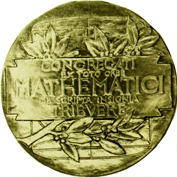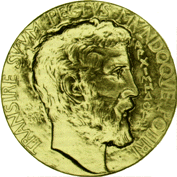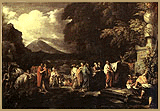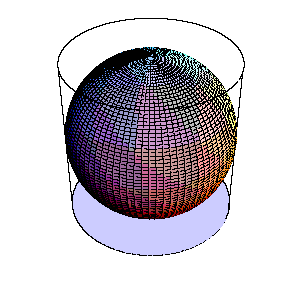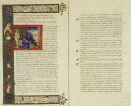The Heiberg manuscript
A page from "On Floating Bodies"
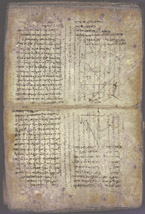
This manuscript was discovered in 1899 at the monastery of the
Holy Sepulchre at Jerusalem. Mathematical symbols were recognized
and the eminent Danish philologist J.L.~Heiberg, who had edited the
works of Archimedes, Euclid, etc., was soon contacted. Heiberg
went to Constantinople in 1906 to examine this document.
What he found was a 10th--century palimpsest, a
parchment containing works of Archimedes that, sometime
between the 12th and 14th centuries, had been partially erased and
overwritten by religious text. Heiberg managed to decipher the
manuscript and found that it included a text of
``The Method,'' a work of Archimedes previously thought lost. (The story
of the transmission of Archimedean manuscripts given in the
book of Dijksterhuis reads like a chapter from ``The Maltese
Falcon'').
The palimpset was soon lost once again, but reappeared recently and
was sold at
auction at Christie's
by an unknown seller and bought by an
unknown buyer
for $2,000,000 on October 29, 1998, see the
report of Fred Rickey, a mathematician
at West Point.
This gave scholars the opportunity to examine it for the first
time in almost 100 years, as described by
Fred Rickey:
``When we arrived Sunday afternoon, I asked where the manuscript was and
headed right for it. It was in a glass case. One of the Christie's people
came over right away to see if I needed help. I responded that I knew
precisely what I was looking at and why it was important, but we struck up
a nice conversation about the manuscript. The work was open to the page
displayed on the cover of the catalogue. That I immediately noted this
impressed the woman (I neglected to ask her name, but she knew a lot about
the manuscript and I suspect it was Hope Mayo --- will check that out
Thursday).
Soon someone was opening the case to put in a little sign about the
manuscript and the woman asked if I would like to examine it more
carefully while the case was open. Indeed I would, I said. She took it out
of the case and placed it on a pair of foam covered wedges on the table.
Got a real good look at. Was free to turn pages and examine it. Of
course, my first interest was in the Method.
It was exceptionally difficult to read. I could see the Archimedian text
where there was no overtext of the Euchologion, but it was very
difficult for me to see much with my poor eyesight. The woman said several
times that the light there was very poor, but I was not convinced. I could
see that there were diagrams there, but could barely make them out. What I
did not previously realize is that Heiberg could not make them out either
and so the diagrams in the printed versions of the Method are by
Heiberg.
The text is in poor condition. There are signs of fire damage and plenty
of evidence of mold (now inert, I was told). There are holes in some
pages, but, all in all, considering it is a millennium old, the vellum
pages are easy to turn.
It was a real thrill to get to examine this manuscript and I look forward
to being there for the sale. I certainly hope that it goes to a library or
museum where scholars can examine it.''
Princeton University was going to make a bid to buy the manuscript,
but backed out when the Greek Orthodox church made a claim that they
were the rightful owners. In fact, they made an attempt to reclaim
the palimpsest as indicated by the following press release from
Christie's, October 29, 1998:
``Christie's is pleased to inform its clients that the Federal Court in New
York last night denied a motion by the Greek Orthodox Patriarchate of
Jerusalem to enjoin this afternoon's sale of the Archimedes Palimpsest.
The judge ruled that under the applicable law our consignor has clear
title to sell the manuscript, and the sale will take place as scheduled.''
Returning this document to the church is absurd. What would they do
with it. Perhaps they wanted to overwrite it again... In any case,
here is a description of the auction as given by Fred Rickey:
``The auction began promptly at 2 with a rereading of the press anouncement.
It was announced as Lot 1, The Archimedes Palimpsest, and a photo of one
leaf was shown on a screen. The auctioneer announced that he had a bid of
480,000. Immediately the bid was 500,000 and then it went up by increments
of $50,000 to one million. The Christie's staff was on the phones with
half a dozen potential buyers, but I only saw one of them bid. Three or
four people in the room placed bids. I did not know any of them and it was
even hard to tell who was bidding. At $1m the bids went up in increments
of $100,000 until the bidding reached $1,800,000. There was some pause,
then a (non-standard) bid of $1,850,000. Then 1.9m. Again the auctioneer
took his time, looking carefully for more bids, giving the bidders time to
think. Then a bid of $2,000,000 and another pause. One bidder said he was
thinking, but the auctioneer said "we have to more on, there are more
books to sell." Another pause, another call for bids. Then, with a crack
of the hammer and the announcement "sold to the gentelman on my right" it
was over. Ellapsed time: less than five minutes.
There was considerable bussle in the room. The person behind us identified
the buyer as Simon Finch, a London dealer, who had bought many books
during the morning portion of the sale.
I did not leave the room immediately, so missed an imprompt news
conference by Felix de Marez Oyens, the Head of the Manuscript Department
at Chrisite's. He revealed that Simon Finch had purchased the book for a
private American, who was not Bill Gates.''
Recently, the
Walters Museum in Baltimore, MD,
managed to track down the anonymous
buyer and managed to convince this person to loan the manuscript
for
exhibit from June 10 to September 5, 1999:
``International news of the manuscript's sale last October
set of a chain of events that would result ultimately in the
Palimpsest's temporary display at the Walters. Walters director Gary
Vikan, a Byzantine scholar, was intrigued by the Palimpsest and,
upon reading the news, charged Walters curator of manuscripts and
rare books William Noel with a top-priority mission: to locate
the manuscript and arrange for an exhibition. Noel's detective work
revealed that a London book dealer who represents the privated
collector is a friend and colleague of The Walters.
Realizing the importance of the Archimedes Palimpsest, the private
collector, who wishes to remain anonymous, was already in search of
a venue through which he could share his valuable new acquisition
with the public. With one of the world's finest and
largest manuscript collections, The Walters, he soon learned, would be
an ideal partner in preparing the work for exhibition and interpreting
its importance to museum visitors. `We are so privileged to be able to
share the Palimpsest,' said Vikan.''
This image is how their web site portrays Archimedes:

In my opinion this exhibit would do much better to replace the
display of the palimpsest, which can only be read by an extremely
limited number of experts, by a translation
of Archimedes works. This has an obvious implication about the
character of the buyer, who has probably never tried to read
or understand Archimedes, even in translation.

 gave the first known mention of Archimedes' wife.
gave the first known mention of Archimedes' wife.

